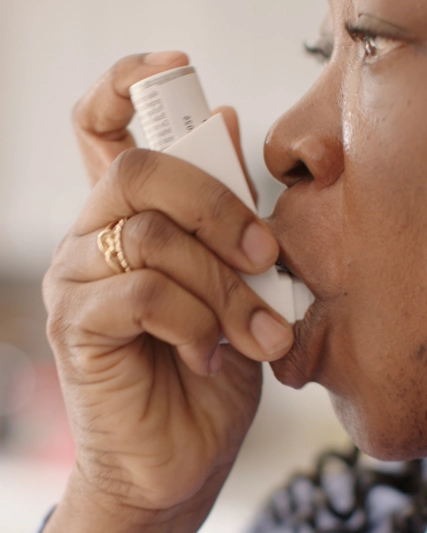Around 10 million people globally suffer from a severe cough that persists for more than a year, leading to loss of sleep, depression, pain, and social isolation. Yet despite its high prevalence, research on this condition – known as refractory chronic cough – has been limited. Thankfully, scientists are working hard to address this unmet need and find out more about it.
Coughing for a few days would test anyone’s patience. But imagine having a cough that persists for months, years, or even decades with no end in sight. That is the reality for many struggling patients who come to see Dr Peter Dicpinigaitis, Professor of Medicine at the Albert Einstein College of Medicine and Director of the Montefiore Cough Center in New York.
“It’s not unusual for me to meet a patient who has been coughing every single day for 10 or 20 years, and has not been to a restaurant, a movie or church during that entire period for fear of one of their terrible coughing bouts,” he says.
Coughing is one of the most common medical complaints, leading to as many as 30 million doctor visits each year in the US alone. Asthma, post-nasal drip, and a condition known as gastroesophageal acid reflux disease – a chronic digestive disease where the liquid content of the stomach refluxes into the oesophagus – account for many cases.
But some patients experience a cough that continues for over eight weeks and doesn’t respond to treatment for any underlying conditions, and the cause remains a mystery. Many patients see multiple experts and undergo an assortment of expensive tests over years but continue to suffer.
After ruling out possible underlying causes, specialists such as Dr Dicpinigaitis and his team often reach the diagnosis of refractory chronic cough. An estimated 10 million people worldwide suffer from this form of cough lasting more than a year. Women have a more sensitive cough reflex than men and account for about two thirds of the cases.
Searching for relief
Patients with refractory chronic cough describe mounting misery and fading hope as their efforts to stop their coughing attacks repeatedly fail.
On top of a 24-hour cough that won’t let up, related symptoms can include depression, sleep loss, intense pain, or even rib fractures. And, in the wake of the COVID-19 pandemic, persistent all-day coughing in public is even more problematic.
“My cough interferes with everything,” says Wendi, a 57-year-old refractory chronic cough patient from New Jersey, US.
“Every single aspect of my personal life, spending time with my children – it really affects doing anything.
“Between dry heaving or incontinence... it is hard to go out in public. Everything is difficult and it’s embarrassing because people stare at you.”
Patients also say they often struggle to be taken seriously by healthcare professionals when they attempt to find a diagnosis for their condition.
“I was told many times by many doctors there is nothing wrong with me, but I knew this was not the case,” Mary Ellen, a 71-year-old refractory chronic cough patient from Boston, US, says.
“For patients who are suffering from similar symptoms, I want to let them know that it's not in your mind and to trust yourself.”
“These patients are not complainers, and they’re not crazy,” Dr Dicpinigaitis, who has been studying coughing for three decades, continues.
“What they have is a real medical condition, and unfortunately in some cases they have gone through the medical system and have been dismissed because doctors couldn’t help, despite their best efforts.
“At other times, refractory chronic cough has not only ruined their lives but has caused great frustration because it isn’t given the proper attention or respect it deserves in terms of how disruptive it is.”
To make matters worse, there are limited treatment options available in most of the world, and while drugs known as neuromodulators may help, only a fraction of patients respond well to and can tolerate them.
Greater understanding
However, researchers are breaking new ground in understanding the science behind refractive chronic cough.
Coughing is a vital reflex, a natural defence mechanism that helps protect the airways and lungs against irritants. The airways contain cough receptors that respond to external stimuli, like dust or germs, that needs to be controlled in the body. A receptor is the end of a nerve that can respond to external stimuli and transmit a signal to the brain, like a telephone wire.
Airway receptors respond to external stimuli by sending a signal to the brain via the nerves in the throat and chest. The muscles in these areas contract and release, expelling air from the lungs via the throat in a cough. But when it comes to refractory chronic cough, scientists believe that some patients develop a hypersensitivity to stimuli such as cold air, strong smells, air pollution, laughing or even exercise that wouldn’t normally trigger a cough.
David Lipson is Vice President and Clinical Research Head of Respiratory at GSK. His team are building on decades of expertise in respiratory care to deliver ambitious, next generation treatment goals for millions of patients.
“We believe there is a significant dysfunction of the cough reflex such that it becomes overstimulated and keeps firing off cough signals to the body inappropriately,” Lipson says.
For decades, researchers sought to develop treatments that block the airway receptors linked to coughing, but despite an increased understanding of the science, they struggled to do so. Some of the treatments they devised caused adverse effects, including altering a patients’ sense of taste, which led to some quitting regimens altogether.
“This has been very frustrating for patients and physicians because when a patient comes in, we know there is not a lot available for them,” he continues.
New research
Now, however, scientists are advancing in their effort to inhibit the stimulation of airway receptors that contribute to excessive coughing.
The novel approach is more selective than previous methods.
“We’ve been able to find an approach that appears to be much more specific compared to the older generation compounds,” Lipson says.
“The idea is that by blocking only that receptor you potentially have even greater reductions in cough frequency and potentially fewer side effects.”
The extent to which this new approach reduces the frequency and severity of refractory chronic cough remains to be seen, but the progress in research is offering some hope to long suffering patients across the world, as well as physicians like Dr Dicpinigaitis.
“In the last 10 years, we have learned a tremendous amount about the mechanism of the cough, and now new approaches will hopefully inhibit this maladaptive, hypersensitive component of the cough reflex while maintaining the important protective cough intact,” he says.
“Even if you don’t completely resolve the cough, improving it partially can mean the difference between being able to leave the house to go to a two-hour movie, or church, or lunch with a friend or not.
“For patients, that would be lifechanging.”





